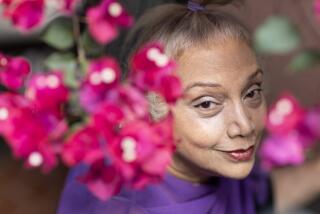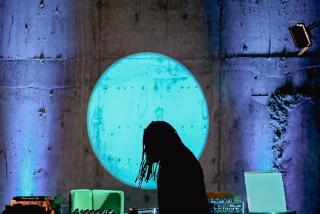Drums and dancers for tolerance
- Share via
Percussionist Ravi Jakhotia, a.k.a. Ravidrums, spun through the warmly lighted dining room, firing off anecdotes and observations so rapidly that he eventually had to stop to catch his breath. It was a busy night for the Indian artist, just back from a tour with J records’ new artist Lamya. He had his hands full coordinating performers for the Ahimsa Music Group show, which stopped at the Sunset Room in Hollywood on Nov. 21.
“It’s crazy!” he said as a woman draped in a shimmering tangerine sari danced amid blooming pink trees on giant television screens behind him. Nearby, a flock of young women draped in a rainbow of saris distributed metal bangles and bindis to female guests.
As Jakhotia’s eyes searched the vast nightclub, he listed the performers on the evening’s bill -- all of whom incorporate South Asian culture into their music. Later, the Doors’ Ray Manzarek would take the stage, as a personal favor, Jakhotia explained. The two men met recently in a New Jersey airport. As Jakhotia’s story goes, he approached Manzarek and said, “Thank you for all the music.” Now they’re performing on each other’s new records. The Doors “were so hip to the Indian thing the first time around,” Jakhotia said.
The evening was hosted by the Ahimsa Fund, a San Francisco-based charity founded after 9/11 to promote cultural understanding among American, South Asian and Arab communities. (“Ahimsa” means nonviolence.) Three Indian Americans in their mid-20s -- Vijay Chattha, Nihal Mehta and Tejas Patel -- launched the fund after two South Asians were killed in hate crimes after the terrorist attacks. “We wanted to find a way to unite all these groups, to create a dialogue with events and do it through music,” Chattha said.
Through ticket sales during the last year, the Ahimsa Fund has raised $20,000 for its parent charity, Shakti Krupa, a Florida-based group that funds education and hospital construction in India. Ahimsa has also raised funds for the families of the two hate-crime victims, has donated equipment to a Hindu temple in Ontario, Canada, that was burned down, and is helping fund development of the first gallery of Sikh heritage at the National Museum of Natural History in Washington, D.C. The recent L.A. show raised $5,000.
At the Sunset Room, club co-owner Raj Kanodia got comfortable on a leather chair the color of caramel. He motioned subtly to Tarsem Singh, director of “The Cell,” slouched low in the next chair. “He’s the next M. Night Shyamalan,” Kanodia said conspiratorially. Then he regained his sense of purpose. “Being a plastic surgeon, I want to inject my Indian culture, with its sound, movies and fashion.... I’m more like a cultural ambassador.” He paused and waved at a woman as she walked by. “She represents Botox,” he said.
Around 11 p.m., the club erupted into a storm of drumming and dancing, with Jakhotia behind a rock drum set on stage and a stout, white-robed man in the crowd pounding a two-sided drum, his white turban vibrating with every beat.
On the TV screens, the words to the John Lennon song “Imagine” appeared over Bollywood film clips of gorgeous women dancing in a gilded palace. Two Anglo guests seemed especially intoxicated by the evening. A man with shoulder-length hair and a knotted goatee leaned toward a woman wearing a thigh-length sari that was sky blue and glitter-shot, and said: “You do have kind of like an aura around you.” She smiled appreciatively.
More to Read
The biggest entertainment stories
Get our big stories about Hollywood, film, television, music, arts, culture and more right in your inbox as soon as they publish.
You may occasionally receive promotional content from the Los Angeles Times.










